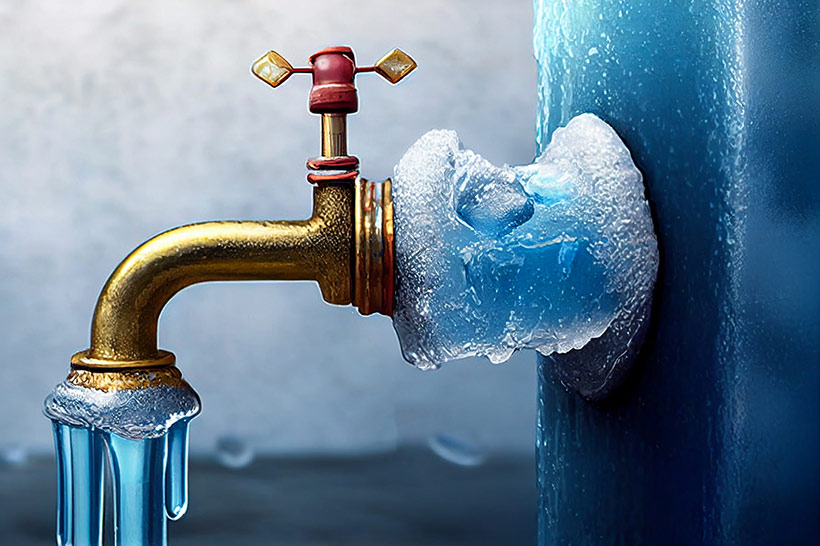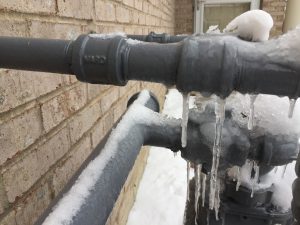How to Protect Your Pipes from Freezing Damage: Important Tips
How to Protect Your Pipes from Freezing Damage: Important Tips
Blog Article
Listed here underneath you'll find more sound ideas concerning Helpful Tips to Prevent Frozen Pipes this Winter.

Cold weather can wreak havoc on your plumbing, particularly by freezing pipelines. Below's just how to stop it from taking place and what to do if it does.
Intro
As temperature levels decrease, the risk of frozen pipelines boosts, potentially leading to pricey fixings and water damage. Understanding just how to avoid frozen pipelines is important for homeowners in cool climates.
Understanding Icy Pipes
What creates pipes to ice up?
Pipes freeze when subjected to temperature levels below 32 ° F (0 ° C) for expanded periods. As water inside the pipes ices up, it expands, taxing the pipeline walls and potentially causing them to break.
Dangers and problems
Frozen pipes can result in supply of water interruptions, building damages, and costly repair work. Burst pipelines can flood homes and create considerable architectural damages.
Signs of Frozen Water Lines
Recognizing frozen pipelines early can prevent them from rupturing.
Just how to determine icy pipes
Try to find lowered water flow from faucets, uncommon odors or noises from pipelines, and noticeable frost on exposed pipes.
Avoidance Tips
Insulating susceptible pipes
Cover pipes in insulation sleeves or utilize warmth tape to shield them from freezing temperatures. Concentrate on pipelines in unheated or exterior locations of the home.
Home heating techniques
Maintain interior rooms appropriately heated up, especially locations with plumbing. Open up closet doors to enable cozy air to distribute around pipelines under sinks.
Safeguarding Exterior Pipes
Garden tubes and outdoor faucets
Detach and drain pipes yard hose pipes prior to winter. Set up frost-proof faucets or cover outdoor faucets with protected caps.
What to Do If Your Pipelines Freeze
Immediate actions to take
If you think icy pipelines, keep faucets available to alleviate stress as the ice thaws. Utilize a hairdryer or towels taken in warm water to thaw pipes gradually.
Long-Term Solutions
Structural modifications
Think about rerouting pipes away from exterior walls or unheated areas. Add extra insulation to attics, basements, and crawl spaces.
Upgrading insulation
Invest in premium insulation for pipes, attic rooms, and wall surfaces. Appropriate insulation assists maintain consistent temperatures and decreases the risk of frozen pipelines.
Final thought
Stopping frozen pipelines needs positive measures and fast actions. By recognizing the causes, indicators, and safety nets, property owners can protect their pipes throughout winter.
Helpful Tips to Prevent Frozen Pipes this Winter
UNDERSTANDING THE BASICS: WHY PIPES FREEZE AND WHY IT’S A PROBLEM
Water freezing inside pipes is common during the winter months, but understanding why pipes freeze, and the potential problems it can cause is crucial in preventing such incidents. This section will delve into the basics of why pipes freeze and the associated problems that may arise.
THE SCIENCE BEHIND FROZEN PIPES
When water reaches freezing temperatures, it undergoes a physical transformation and solidifies into ice. This expansion of water as it freezes is the primary reason pipes can burst. As the water inside the pipe freezes, it expands, creating immense pressure on the walls. If the pressure becomes too great, the pipe can crack or rupture, leading to leaks and water damage.
FACTORS THAT CONTRIBUTE TO PIPE FREEZING
Low Temperatures: Extremely cold weather, especially below freezing, increases the risk of pipes freezing. Uninsulated or Poorly Insulated Pipes: Pipes located in unheated areas, such as basements, crawl spaces, or attics, are more prone to freezing. Insufficient insulation or lack of insulation altogether exacerbates the problem. Exterior Wall Exposure: Pipes running along exterior walls are susceptible to freezing as they encounter colder temperatures outside. Lack of Heating or Temperature Regulation: Inadequate heating or inconsistent temperature control in your home can contribute to frozen pipes. PROBLEMS CAUSED BY FROZEN PIPES
- Pipe Bursting: As mentioned earlier, the expansion of water as it freezes can cause pipes to burst, resulting in significant water damage.
- Water Damage: When pipes burst, it can lead to flooding and water damage to your property, including walls, ceilings, flooring, and personal belongings.
- Structural Damage: Prolonged exposure to water from burst pipes can compromise the structural integrity of your home, leading to costly repairs.
- Mold and Mildew Growth: Excess moisture from water damage can create a favorable environment for mold and mildew growth, posing health risks to occupants.
- Disrupted Water Supply: Frozen pipes can also result in a complete or partial loss of water supply until the issue is resolved.
WHY CERTAIN PIPES ARE MORE PRONE TO FREEZING
- Location: Pipes located in unheated or poorly insulated areas, such as basements, crawl spaces, attics, or exterior walls, are at higher risk of freezing.
- Exterior Pipes: Outdoor pipes, such as those used for irrigation or exposed plumbing, are particularly vulnerable to freezing as they are directly exposed to the elements.
- Supply Lines: Pipes that carry water from the main water supply into your home, including the main water line, are critical to protect as freezing in these lines can affect your entire plumbing system.
- Underground Pipes: Pipes buried underground, such as those connected to sprinkler systems or outdoor faucets, can be susceptible to freezing if not properly insulated.
https://busybusy.com/blog/helpful-tips-to-prevent-frozen-pipes-this-winter/

We were shown that article about 6 Ways to Prevent Frozen Pipes from an associate on our other web blog. So long as you enjoyed reading our blog posting if you please do not forget to share it. I treasure reading our article about 6 Ways to Prevent Frozen Pipes.
Visit My Web Page Report this page